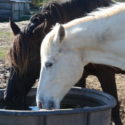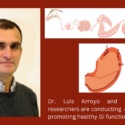Equine News
Learn How Horses Communicate in this Free Online Course for Youth
Adult offering too! Learn Together for a fun Family Day Experience! Do you love horses and want to understand them better? Do you want to learn how to read their body language, and the cues they give one another? If so, you might be interested in a free online course offered by Equine Guelph, the…
Colic Prevention Education Month 2024 Focuses on GI Health for Your Horse
February is Equine Guelph’s Colic Prevention Education Month when we tackle the number one killer of horses with our highly popular free healthcare tool, Colic Risk Rater (http://www.thehorseportal.ca/ColicTool). After you complete the free risk rater to assess your horse’s risk, you will have the option to learn more by signing up for Equine Guelph’s short…
A Stable Gut: The Key to a Healthy Equine
Equine Guelph 2024 Research Annual Volume 21 – cover story by: Jackie Bellamy-Zions Gastrointestinal issues (GI) are the number one cause of morbidity in horses other than old age. An unhealthy digestive system can cause poor performance, pain, discomfort, diarrhea, and a whole host of issues that can sideline your horse. It’s no wonder researchers…
20th Anniversary Feature with Shawna Ward
Alumni, Shawna Ward shares her passion for equine management after taking Equine Guelph’s online 12-week courses. The nutrition course in particular has reduced Shawna’s horse keeping costs. Forage based diets was a topic of great interest for Shawna. The following downloadable information sheet explains key take-aways and the benefits of feeding a forage based diet.
Go with Your Gut: Learn from the Racehorse Gut Health & Ulcer/Colic Prevention Course on TheHorsePortal.ca
For the third year in a row, Equine Guelph has partnered with Central Ontario Standardbred Association (COSA), Ontario Racing and Standardbred Canada to offer three online courses in Winter of 2024 in priority healthcare areas of lameness, respiratory and gut health. Sponsored by COSA, the Racehorse Gut Health & Ulcer/Colic Prevention course is the second…






